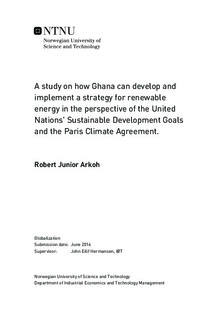A study on how Ghana can develop and implement a strategy for renewable energy in the perspective of the United Nations' Sustainable Development Goals and the Paris Climate Agreement.
Master thesis
Permanent lenke
http://hdl.handle.net/11250/2433835Utgivelsesdato
2016Metadata
Vis full innførselSamlinger
Sammendrag
ABSTRACTGhana is far from having a sustainable and independent energy system. The current energymix in the country is: traditional biomass (66.7%); crude oil ̸petroleum products (26.2%);and electricity (7.1%) is mainly from high hydro plants. The present energy insecuritydilemma where demand for energy is sufficiently needed for sustainable developmentleaves Ghana with no option than to exploit her renewable energy resources and increaseelectricity supply. The study seeks to address five main research questions: (a) What are thesources of renewable energy in Ghana? (b) What capacity does Ghana have in theproduction and consumption of renewable energy? (c) What are the strategies for theimplementation of renewable energy in Ghana? (d) How are these strategies implementedin the perspective of the United Nation s Sustainable Development Goals and the ParisClimate Agreement? (e) What are the constraints to investment in renewable energygeneration?The four main Renewable Energy resources identified in Ghana are solar, biomass, hydroenergy and wind energy. Detailed analysis for each resource was done. The studyconcludes with a plan on where, why, and how to implement renewable energy strategies inthe perspective of the UN SDGs and the Paris Climate Agreement. The study thereforerecommends that there should be a creation of regulatory framework that is RE friendly andpromoting awareness of the benefits of RETs.
